Boardman J., Hammond N.G. L. The Cambridge Ancient History Volume 3, Part 3: The Expansion of the Greek World, Eighth to Sixth Centuries BC
Подождите немного. Документ загружается.

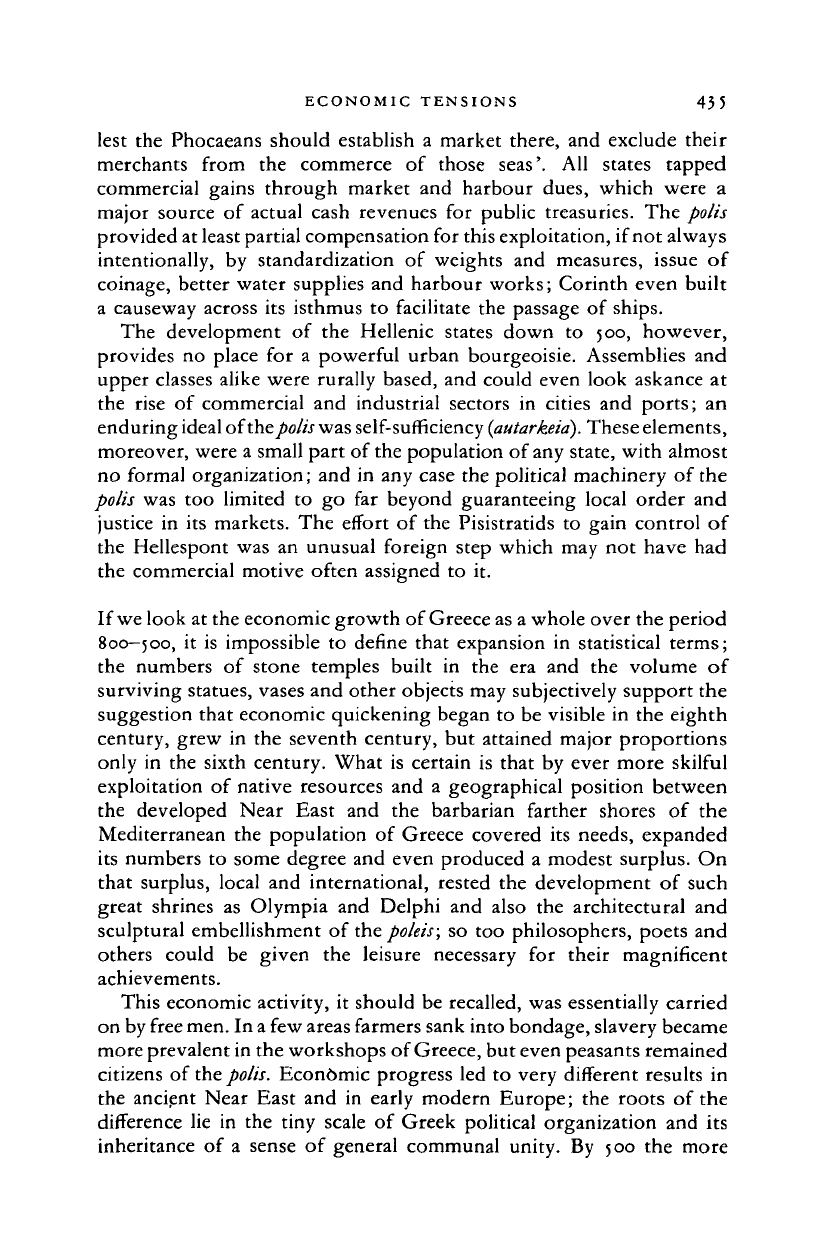
ECONOMIC TENSIONS 43
5
lest the Phocaeans should establish a market there, and exclude their
merchants from the commerce of those seas'. All states tapped
commercial gains through market and harbour dues, which were a
major source of actual cash revenues for public treasuries. The polis
provided at least partial compensation for this exploitation, if not always
intentionally, by standardization of weights and measures, issue of
coinage, better water supplies and harbour works; Corinth even built
a causeway across its isthmus to facilitate the passage of ships.
The development of the Hellenic states down to 500, however,
provides no place for a powerful urban bourgeoisie. Assemblies and
upper classes alike were rurally based, and could even look askance at
the rise of commercial and industrial sectors in cities and ports; an
enduring ideal of the,
polis was
self-sufficiency
(autarkeia).
These elements,
moreover, were a small part of the population of any state, with almost
no formal organization; and in any case the political machinery of the
polis was too limited to go far beyond guaranteeing local order and
justice in its markets. The effort of the Pisistratids to gain control of
the Hellespont was an unusual foreign step which may not have had
the commercial motive often assigned to it.
If we look at the economic growth of Greece as a whole over the period
800—500, it is impossible to define that expansion in statistical terms;
the numbers of stone temples built in the era and the volume of
surviving statues, vases and other objects may subjectively support the
suggestion that economic quickening began to be visible in the eighth
century, grew in the seventh century, but attained major proportions
only in the sixth century. What is certain is that by ever more skilful
exploitation of native resources and a geographical position between
the developed Near East and the barbarian farther shores of the
Mediterranean the population of Greece covered its needs, expanded
its numbers to some degree and even produced a modest surplus. On
that surplus, local and international, rested the development of such
great shrines as Olympia and Delphi and also the architectural and
sculptural embellishment of the
poleis;
so too philosophers, poets and
others could be given the leisure necessary for their magnificent
achievements.
This economic activity, it should be recalled, was essentially carried
on by free
men.
In
a
few areas farmers sank into bondage, slavery became
more prevalent in the workshops of Greece, but even peasants remained
citizens of the
polis.
Econbmic progress led to very different results in
the ancient Near East and in early modern Europe; the roots of the
difference lie in the tiny scale of Greek political organization and its
inheritance of a sense of general communal unity. By 500 the more
Cambridge Histories Online © Cambridge University Press, 2008
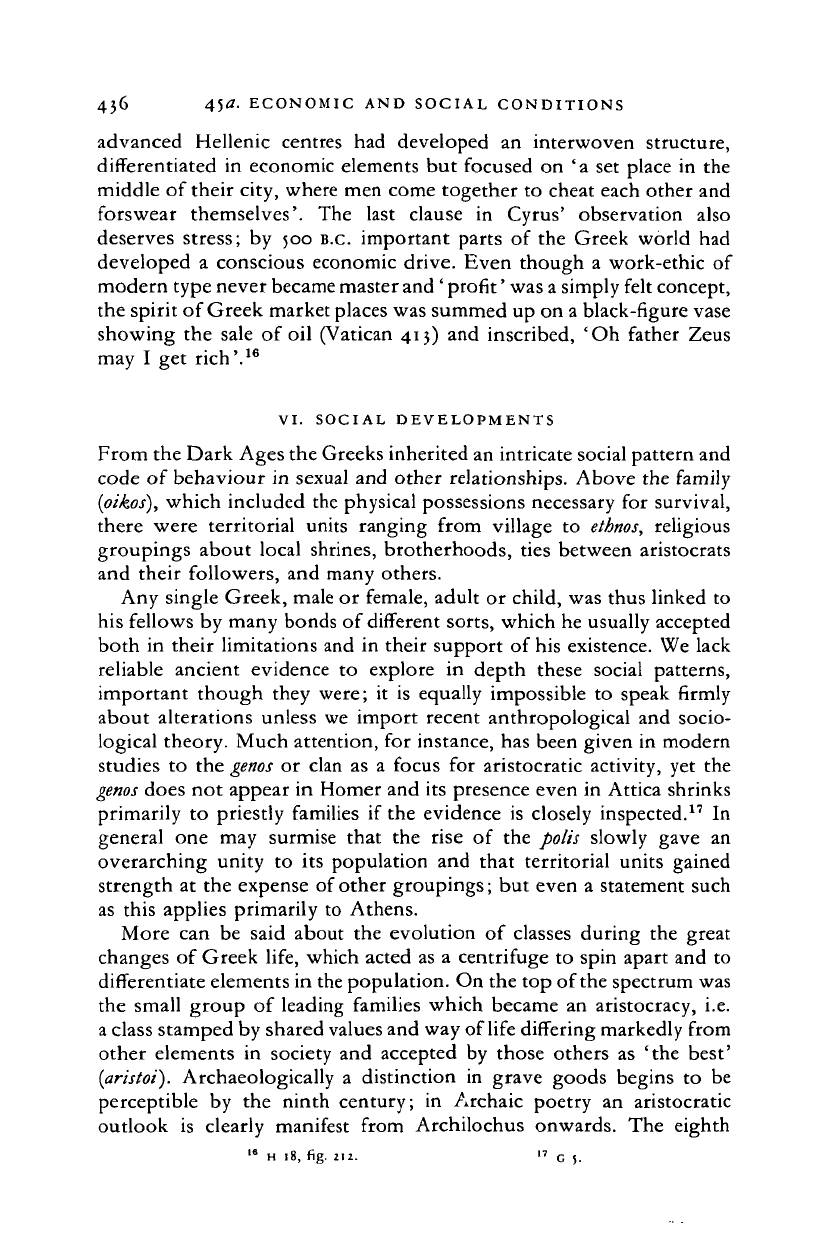
436 45
a
- ECONOMIC AND SOCIAL CONDITIONS
advanced Hellenic centres
had
developed
an
interwoven structure,
differentiated
in
economic elements but focused
on 'a
set place
in
the
middle of their city, where men come together to cheat each other and
forswear themselves'.
The
last clause
in
Cyrus' observation also
deserves stress;
by
500
B.C.
important parts
of
the Greek world had
developed
a
conscious economic drive. Even though
a
work-ethic
of
modern type never became master and ' profit' was
a
simply felt concept,
the spirit of Greek market places was summed up on a black-figure vase
showing the sale
of
oil (Vatican 413) and inscribed, 'Oh father Zeus
may
I
get rich'.
16
VI.
SOCIAL DEVELOPMENTS
From the Dark Ages the Greeks inherited an intricate social pattern and
code
of
behaviour in sexual and other relationships. Above the family
(oikos),
which included the physical possessions necessary for survival,
there were territorial units ranging from village
to
ethnos,
religious
groupings about local shrines, brotherhoods, ties between aristocrats
and their followers, and many others.
Any single Greek, male or female, adult or child, was thus linked
to
his fellows by many bonds of different sorts, which he usually accepted
both
in
their limitations and in their support of his existence. We lack
reliable ancient evidence
to
explore
in
depth these social patterns,
important though they were;
it is
equally impossible
to
speak firmly
about alterations unless we import recent anthropological and socio-
logical theory. Much attention, for instance, has been given in modern
studies
to
the
genos
or
clan
as a
focus
for
aristocratic activity, yet the
genos
does not appear in Homer and its presence even in Attica shrinks
primarily
to
priestly families
if
the evidence
is
closely inspected.
17
In
general
one may
surmise that
the
rise
of
the polis slowly gave
an
overarching unity
to its
population
and
that territorial units gained
strength
at
the expense of other groupings; but even
a
statement such
as this applies primarily to Athens.
More
can be
said about the evolution
of
classes during the great
changes of Greek life, which acted as
a
centrifuge to spin apart and
to
differentiate elements in the population. On the top of the spectrum was
the small group
of
leading families which became
an
aristocracy,
i.e.
a class stamped by shared values and way of life differing markedly from
other elements
in
society and accepted
by
those others
as
'the best'
[aristot).
Archaeologically
a
distinction
in
grave goods begins
to be
perceptible
by the
ninth century;
in
Archaic poetry
an
aristocratic
outlook
is
clearly manifest from Archilochus onwards. The eighth
16
H 18, fig. 212. " C J.
Cambridge Histories Online © Cambridge University Press, 2008
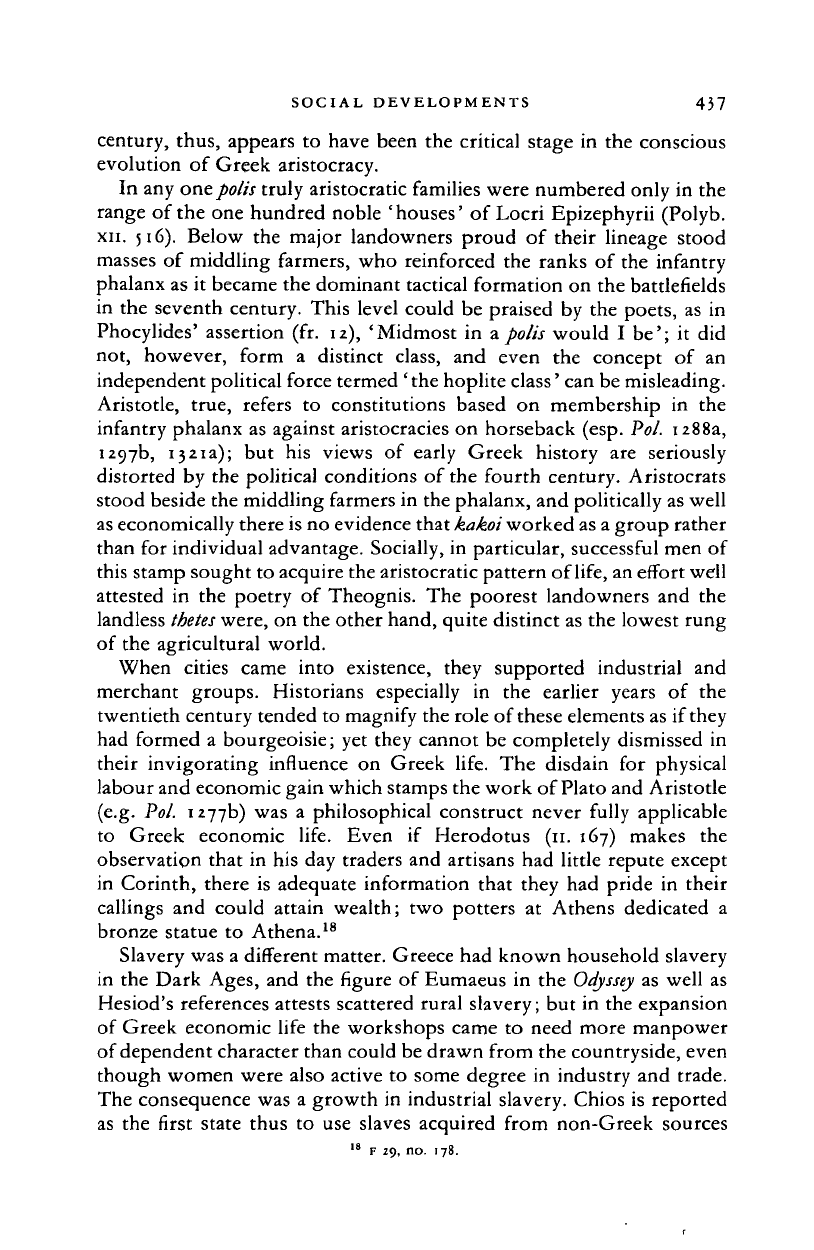
SOCIAL DEVELOPMENTS 437
century, thus, appears
to
have been the critical stage in the conscious
evolution
of
Greek aristocracy.
In any one
polis
truly aristocratic families were numbered only in the
range of the one hundred noble 'houses' of Locri Epizephyrii (Polyb.
XII.
516). Below
the
major landowners proud
of
their lineage stood
masses
of
middling farmers, who reinforced the ranks
of
the infantry
phalanx as
it
became the dominant tactical formation on the battlefields
in the seventh century. This level could be praised by the poets, as
in
Phocylides' assertion (fr. 12), 'Midmost
in
a.polis
would
I
be';
it
did
not, however, form
a
distinct class,
and
even
the
concept
of an
independent political force termed ' the hoplite class' can be misleading.
Aristotle, true, refers
to
constitutions based
on
membership
in the
infantry phalanx as against aristocracies on horseback (esp. Pol. 1288a,
1297b, 1321a);
but his
views
of
early Greek history
are
seriously
distorted by the political conditions of the fourth century. Aristocrats
stood beside the middling farmers in the phalanx, and politically as well
as economically there is no evidence that kakoi worked as a group rather
than for individual advantage. Socially, in particular, successful men of
this stamp sought to acquire the aristocratic pattern of
life,
an effort well
attested
in
the poetry
of
Theognis. The poorest landowners and
the
landless
thetes
were, on the other hand, quite distinct as the lowest rung
of the agricultural world.
When cities came into existence, they supported industrial
and
merchant groups. Historians especially
in the
earlier years
of the
twentieth century tended to magnify the role of these elements as if they
had formed
a
bourgeoisie; yet they cannot be completely dismissed
in
their invigorating influence
on
Greek life. The disdain
for
physical
labour and economic gain which stamps the work of Plato and Aristotle
(e.g. Pol. 1277b) was
a
philosophical construct never fully applicable
to Greek economic life. Even
if
Herodotus (11. 167) makes
the
observation that in his day traders and artisans had little repute except
in Corinth, there
is
adequate information that they had pride
in
their
callings and could attain wealth; two potters
at
Athens dedicated
a
bronze statue
to
Athena.
18
Slavery was a different matter. Greece had known household slavery
in the Dark Ages, and the figure
of
Eumaeus
in
the
Odyssey
as well
as
Hesiod's references attests scattered rural slavery; but in the expansion
of Greek economic life the workshops came
to
need more manpower
of dependent character than could be drawn from the countryside, even
though women were also active to some degree in industry and trade.
The consequence was a growth in industrial slavery. Chios is reported
as the first state thus
to
use slaves acquired from non-Greek sources
178.
Cambridge Histories Online © Cambridge University Press, 2008
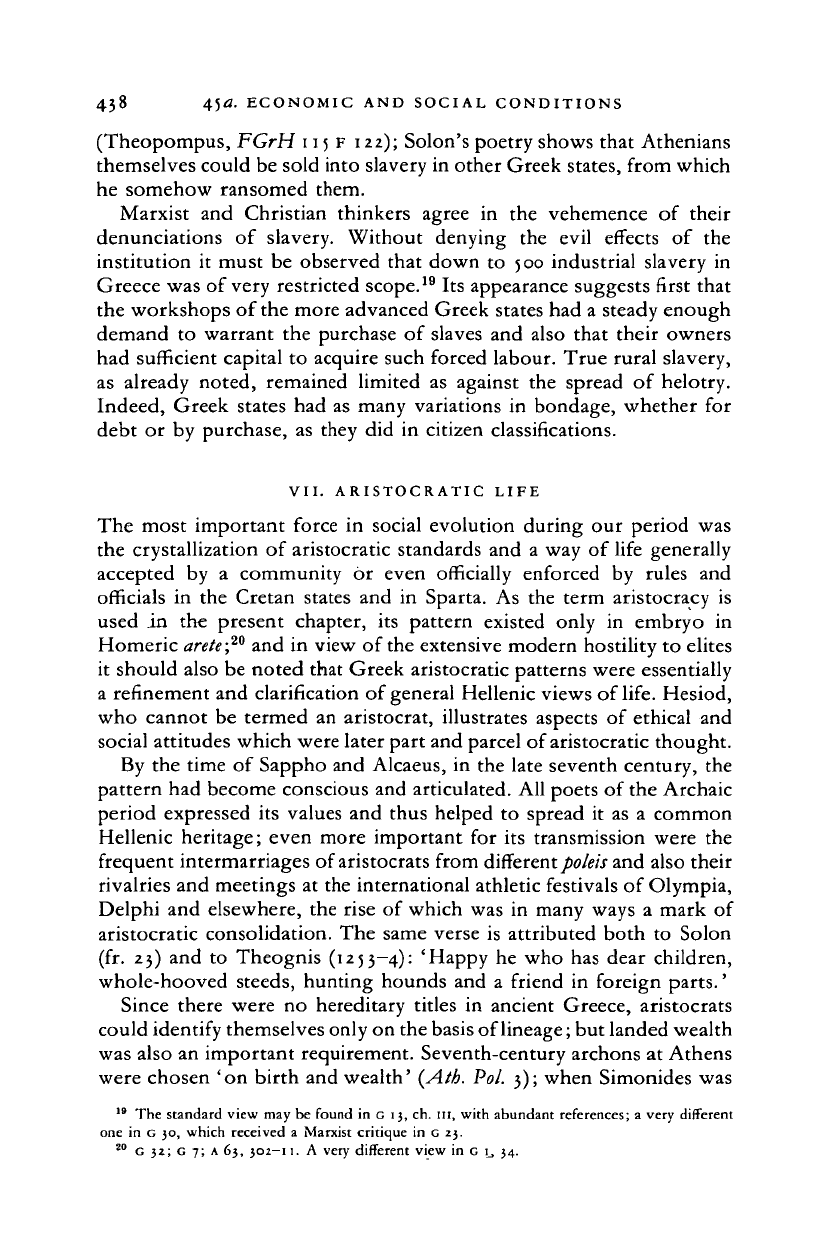
438
45
fl
-
ECONOMIC AND SOCIAL CONDITIONS
(Theopompus, FGrH 115 F 122); Solon's poetry shows that Athenians
themselves could be sold into slavery in other Greek states, from which
he somehow ransomed them.
Marxist and Christian thinkers agree
in
the vehemence
of
their
denunciations
of
slavery. Without denying the evil effects
of
the
institution it must be observed that down to 500 industrial slavery in
Greece was of very restricted scope.
19
Its appearance suggests first that
the workshops of the more advanced Greek states had a steady enough
demand to warrant the purchase of slaves and also that their owners
had sufficient capital to acquire such forced labour. True rural slavery,
as already noted, remained limited as against the spread of helotry.
Indeed, Greek states had as many variations in bondage, whether for
debt or by purchase, as they did in citizen classifications.
VII.
ARISTOCRATIC LIFE
The most important force in social evolution during our period was
the crystallization of aristocratic standards and a way of life generally
accepted by
a
community
or
even officially enforced by rules and
officials in the Cretan states and in Sparta. As the term aristocracy is
used in the present chapter, its pattern existed only
in
embryo
in
Homeric
arete;
20
and in view of the extensive modern hostility to elites
it should also be noted that Greek aristocratic patterns were essentially
a refinement and clarification of general Hellenic views of life. Hesiod,
who cannot be termed an aristocrat, illustrates aspects of ethical and
social attitudes which were later part and parcel of aristocratic thought.
By the time of Sappho and Alcaeus, in the late seventh century, the
pattern had become conscious and articulated. All poets of the Archaic
period expressed its values and thus helped to spread it as a common
Hellenic heritage; even more important for its transmission were the
frequent intermarriages of aristocrats from different
poleis
and also their
rivalries and meetings at the international athletic festivals of Olympia,
Delphi and elsewhere, the rise of which was in many ways a mark of
aristocratic consolidation. The same verse is attributed both to Solon
(fr. 23) and to Theognis (1253-4): 'Happy he who has dear children,
whole-hooved steeds, hunting hounds and a friend in foreign parts.'
Since there were no hereditary titles in ancient Greece, aristocrats
could identify themselves only on the basis of lineage; but landed wealth
was also an important requirement. Seventh-century archons at Athens
were chosen 'on birth and wealth' (Ath. Pol. 3); when Simonides was
19
The
standard view
may be
found
in G 13, ch. in,
with abundant references;
a
very different
one
in G 30,
which received
a
Marxist critique
in G 23.
20
G 32; G 7; A 63,
302-11.
A
very different view
in G
r,
34.
Cambridge Histories Online © Cambridge University Press, 2008
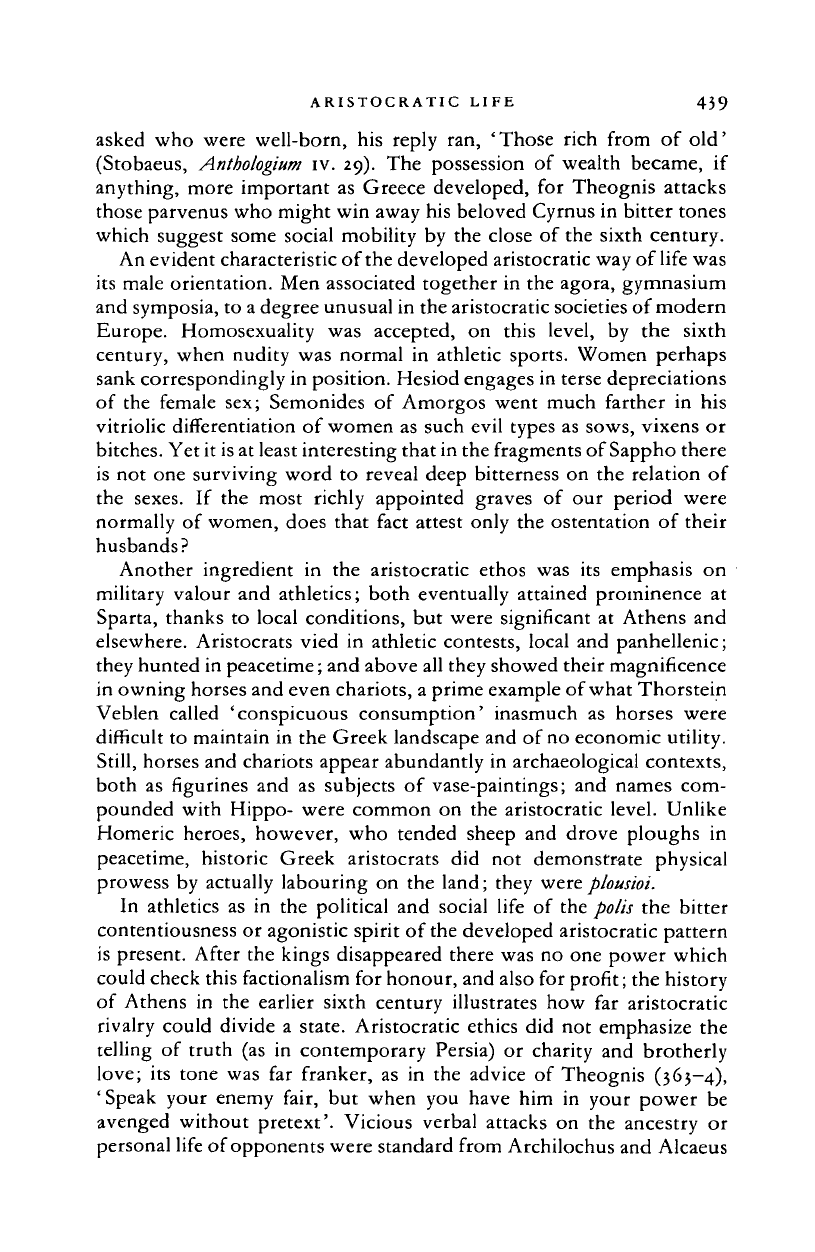
ARISTOCRATIC LIFE 439
asked who were well-born, his reply ran, 'Those rich from
of
old'
(Stobaeus,
Anthologium
iv. 29). The possession
of
wealth became,
if
anything, more important as Greece developed, for Theognis attacks
those parvenus who might win away his beloved Cyrnus in bitter tones
which suggest some social mobility by the close of the sixth century.
An evident characteristic of
the
developed aristocratic way of life was
its male orientation. Men associated together in the agora, gymnasium
and symposia, to a degree unusual in the aristocratic societies of modern
Europe. Homosexuality was accepted,
on
this level,
by the
sixth
century, when nudity was normal
in
athletic sports. Women perhaps
sank correspondingly in position. Hesiod engages in terse depreciations
of the female sex; Semonides
of
Amorgos went much farther
in
his
vitriolic differentiation of women as such evil types as sows, vixens or
bitches. Yet it is at least interesting that in the fragments of Sappho there
is not one surviving word to reveal deep bitterness on the relation of
the sexes.
If
the most richly appointed graves
of
our period were
normally of women, does that fact attest only the ostentation of their
husbands?
Another ingredient
in
the aristocratic ethos was
its
emphasis
on
military valour and athletics; both eventually attained prominence
at
Sparta, thanks to local conditions, but were significant at Athens and
elsewhere. Aristocrats vied
in
athletic contests, local and panhellenic;
they hunted in peacetime; and above all they showed their magnificence
in owning horses and even chariots, a prime example of what Thorstein
Veblen called 'conspicuous consumption' inasmuch
as
horses were
difficult to maintain in the Greek landscape and of no economic utility.
Still, horses and chariots appear abundantly in archaeological contexts,
both as figurines and
as
subjects
of
vase-paintings; and names com-
pounded with Hippo- were common on the aristocratic level. Unlike
Homeric heroes, however, who tended sheep and drove ploughs
in
peacetime, historic Greek aristocrats
did not
demonstrate physical
prowess by actually labouring on the land; they were
plousioi.
In athletics as
in
the political and social life
of
the polis the bitter
contentiousness or agonistic spirit of the developed aristocratic pattern
is present. After the kings disappeared there was no one power which
could check this factionalism for honour, and also for profit; the history
of Athens
in
the earlier sixth century illustrates how
far
aristocratic
rivalry could divide
a
state. Aristocratic ethics did not emphasize the
telling
of
truth (as
in
contemporary Persia)
or
charity and brotherly
love;
its tone was
far
franker, as
in
the advice
of
Theognis (363—4),
' Speak your enemy fair, but when you have him
in
your power
be
avenged without pretext'. Vicious verbal attacks
on
the ancestry
or
personal life of opponents were standard from Archilochus and Alcaeus
Cambridge Histories Online © Cambridge University Press, 2008
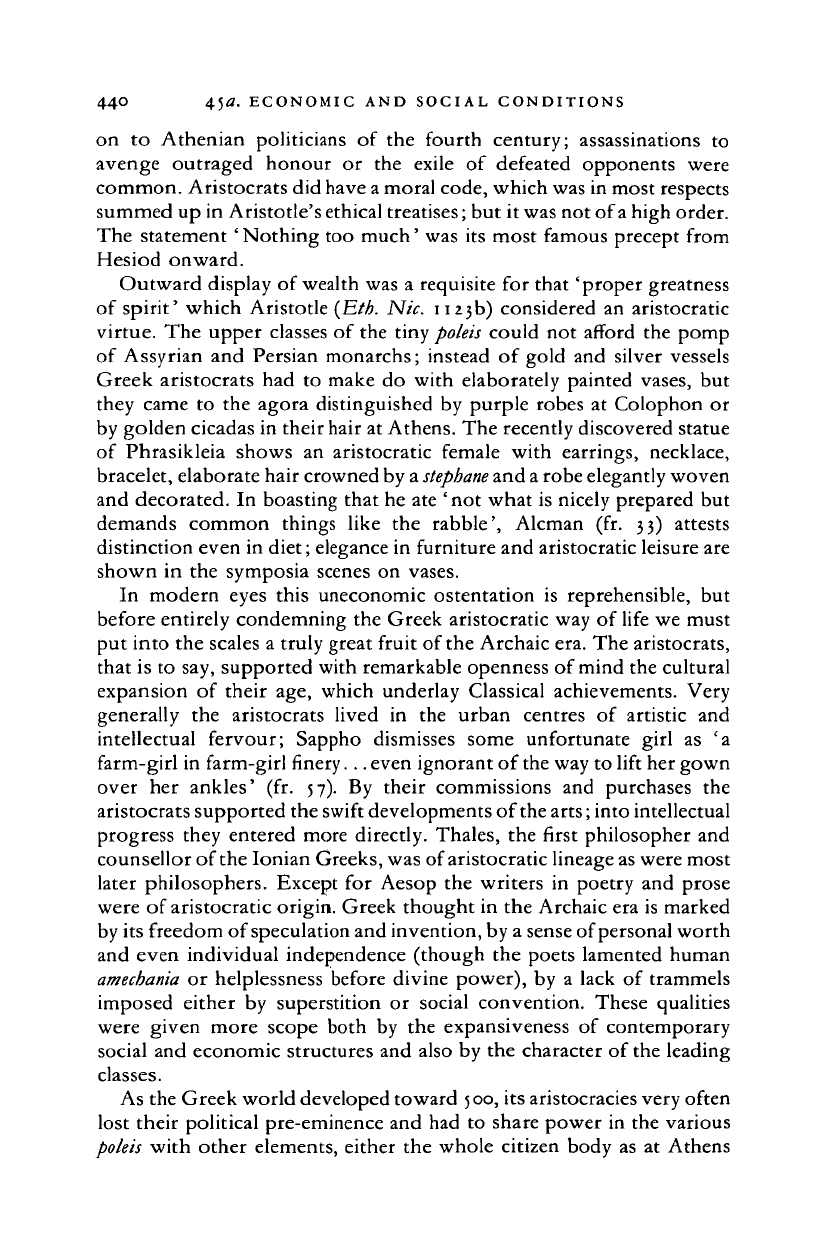
44° 45
a
- ECONOMIC AND SOCIAL CONDITIONS
on
to
Athenian politicians
of
the fourth century; assassinations
to
avenge outraged honour
or the
exile
of
defeated opponents were
common. Aristocrats did have a moral code, which was in most respects
summed up in Aristotle's ethical treatises; but it was not of a high order.
The statement ' Nothing too much' was its most famous precept from
Hesiod onward.
Outward display of wealth was a requisite for that 'proper greatness
of spirit' which Aristotle (EM. Nic. 1123b) considered an aristocratic
virtue. The upper classes of the tiny
poleis
could not afford the pomp
of Assyrian and Persian monarchs; instead
of
gold and silver vessels
Greek aristocrats had to make do with elaborately painted vases, but
they came
to
the agora distinguished by purple robes
at
Colophon or
by golden cicadas in their hair at Athens. The recently discovered statue
of Phrasikleia shows
an
aristocratic female with earrings, necklace,
bracelet, elaborate hair crowned by
a stephane
and
a
robe elegantly woven
and decorated. In boasting that he ate 'not what is nicely prepared but
demands common things like
the
rabble', Alcman
(fr. 33)
attests
distinction even in diet; elegance in furniture and aristocratic leisure are
shown in the symposia scenes on vases.
In modern eyes this uneconomic ostentation
is
reprehensible,
but
before entirely condemning the Greek aristocratic way of life we must
put into the scales a truly great fruit of the Archaic era. The aristocrats,
that is to say, supported with remarkable openness of mind the cultural
expansion
of
their age, which underlay Classical achievements. Very
generally
the
aristocrats lived
in the
urban centres
of
artistic
and
intellectual fervour; Sappho dismisses some unfortunate girl
as 'a
farm-girl in farm-girl finery. .. even ignorant of
the
way to lift her gown
over
her
ankles'
(fr.
57).
By
their commissions
and
purchases
the
aristocrats supported the swift developments of the
arts;
into intellectual
progress they entered more directly. Thales, the first philosopher and
counsellor of the Ionian Greeks, was of aristocratic lineage as were most
later philosophers. Except for Aesop the writers
in
poetry and prose
were of aristocratic origin. Greek thought in the Archaic era is marked
by its freedom of speculation and invention, by a sense of personal worth
and even individual independence (though the poets lamented human
amechania
or
helplessness before divine power), by
a
lack
of
trammels
imposed either
by
superstition
or
social convention. These qualities
were given more scope both
by
the expansiveness
of
contemporary
social and economic structures and also by the character of the leading
classes.
As the Greek world developed toward 500, its aristocracies very often
lost their political pre-eminence and had to share power in the various
poleis
with other elements, either the whole citizen body as
at
Athens
Cambridge Histories Online © Cambridge University Press, 2008
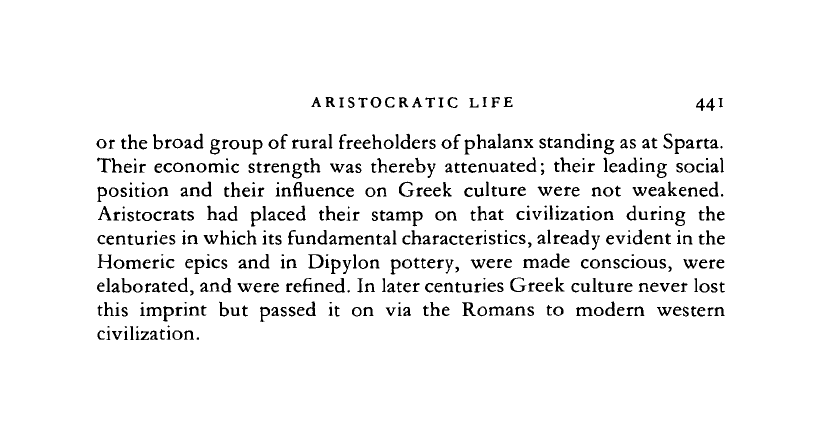
ARISTOCRATIC LIFE 441
or the broad group of rural freeholders of phalanx standing as at Sparta.
Their economic strength was thereby attenuated; their leading social
position
and
their influence
on
Greek culture were
not
weakened.
Aristocrats
had
placed their stamp
on
that civilization during
the
centuries in which its fundamental characteristics, already evident in the
Homeric epics and
in
Dipylon pottery, were made conscious, were
elaborated, and were refined. In later centuries Greek culture never lost
this imprint
but
passed
it on via the
Romans
to
modern western
civilization.
Cambridge Histories Online © Cambridge University Press, 2008
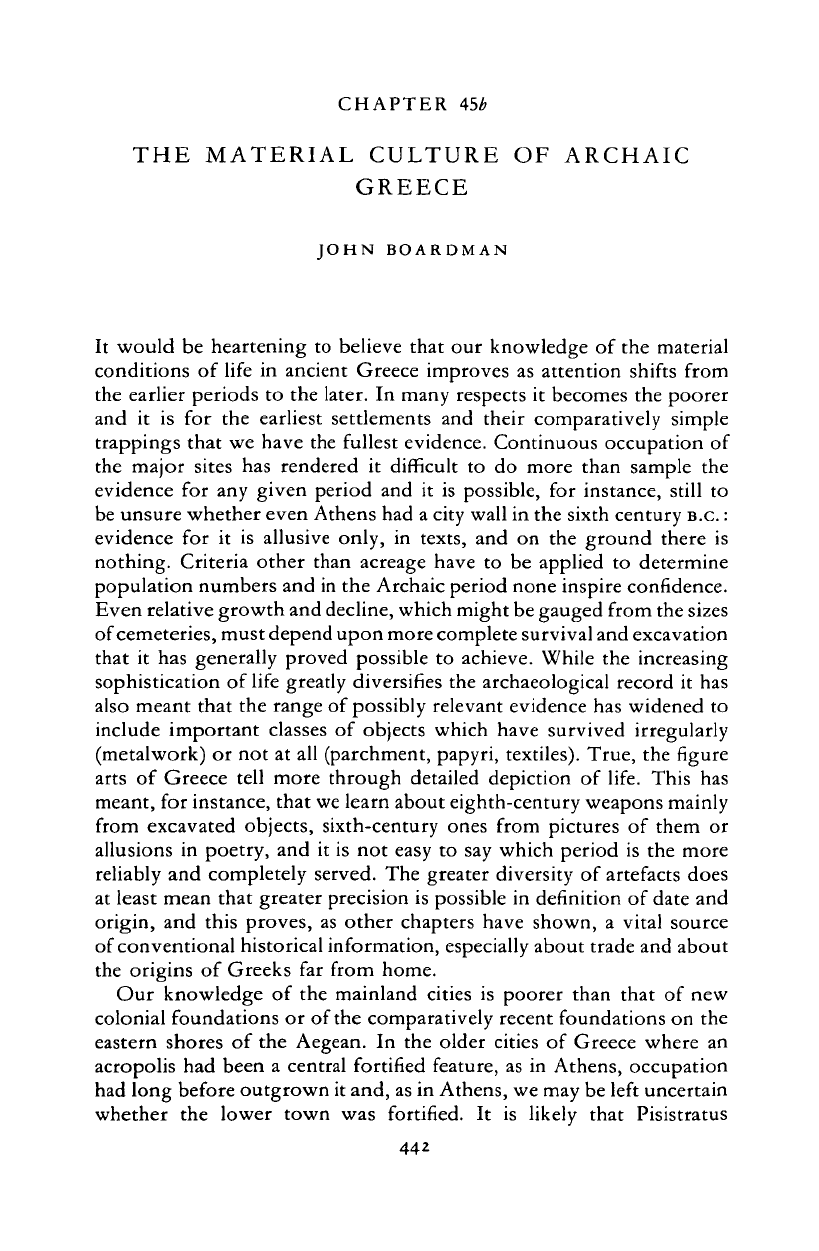
CHAPTER 45b
THE MATERIAL CULTURE
OF
ARCHAIC
GREECE
JOHN BOARDMAN
It would
be
heartening
to
believe that our knowledge
of
the material
conditions
of
life
in
ancient Greece improves
as
attention shifts from
the earlier periods
to
the later.
In
many respects
it
becomes the poorer
and
it is for
the
earliest settlements
and
their comparatively simple
trappings that we have the fullest evidence. Continuous occupation
of
the major sites
has
rendered
it
difficult
to
do
more than sample
the
evidence
for
any given period
and
it is
possible,
for
instance, still
to
be unsure whether even Athens had a city wall in the sixth century B.C.:
evidence
for
it is
allusive only,
in
texts,
and on the
ground there
is
nothing. Criteria other than acreage have
to
be
applied
to
determine
population numbers and in the Archaic period none inspire confidence.
Even relative growth and decline, which might be gauged from the sizes
of cemeteries, must depend upon more complete survival and excavation
that
it
has generally proved possible
to
achieve. While
the
increasing
sophistication of life greatly diversifies the archaeological record
it
has
also meant that the range of possibly relevant evidence has widened
to
include important classes
of
objects which have survived irregularly
(metalwork)
or
not
at
all (parchment, papyri, textiles). True, the figure
arts
of
Greece tell more through detailed depiction
of
life. This
has
meant, for instance, that we learn about eighth-century weapons mainly
from excavated objects, sixth-century ones from pictures
of
them
or
allusions
in
poetry, and
it
is not easy
to
say which period
is
the more
reliably and completely served. The greater diversity
of
artefacts does
at least mean that greater precision is possible
in
definition
of
date and
origin,
and
this proves,
as
other chapters have shown,
a
vital source
of conventional historical information, especially about trade and about
the origins
of
Greeks
far
from home.
Our knowledge
of
the mainland cities
is
poorer than that
of
new
colonial foundations
or
of
the
comparatively recent foundations on the
eastern shores
of
the Aegean.
In
the
older cities
of
Greece where
an
acropolis had been
a
central fortified feature, as
in
Athens, occupation
had long before outgrown it and, as in Athens, we may be left uncertain
whether
the
lower town
was
fortified.
It is
likely that Pisistratus
442
Cambridge Histories Online © Cambridge University Press, 2008
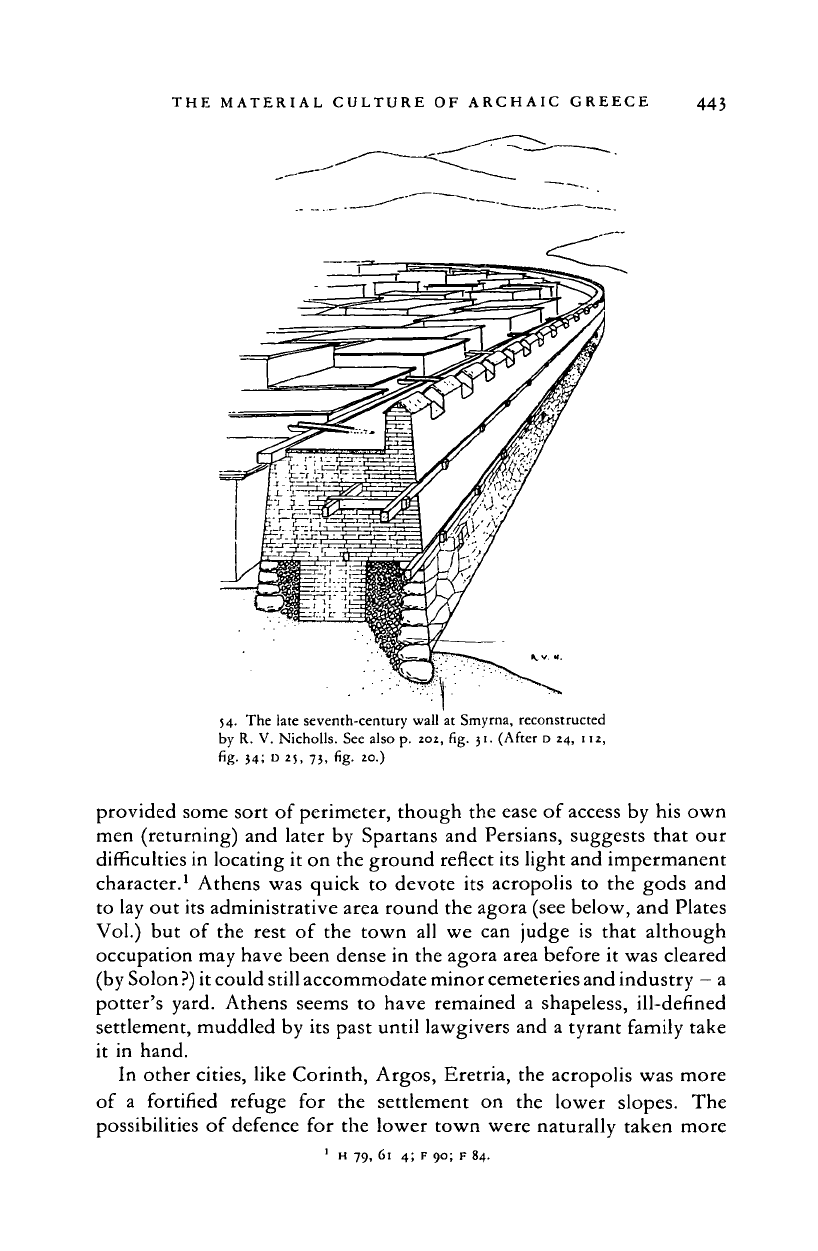
THE MATERIAL CULTURE OF ARCHAIC GREECE
443
54.
The late seventh-century wall
at
Smyrna, reconstructed
by
R. V.
Nicholls. See also p. 202,
fig.
31. (After D 24,
112,
fig.
34;
D
25, 73,
fig.
20.)
provided some sort of perimeter, though the ease of access by his own
men (returning) and later by Spartans and Persians, suggests that our
difficulties in locating it on the ground reflect its light and impermanent
character.
1
Athens was quick
to
devote
its
acropolis
to
the gods and
to lay out its administrative area round the agora (see below, and Plates
Vol.)
but of
the rest
of
the town
all we
can judge
is
that although
occupation may have been dense in the agora area before
it
was cleared
(by Solon
?)
it could still accommodate minor cemeteries and industry
—
a
potter's yard. Athens seems
to
have remained
a
shapeless, ill-defined
settlement, muddled by its past until lawgivers and a tyrant family take
it
in
hand.
In other cities, like Corinth, Argos, Eretria, the acropolis was more
of
a
fortified refuge
for the
settlement
on the
lower slopes.
The
possibilities
of
defence
for
the lower town were naturally taken more
1
H 79,
6l
4; F 90; F 84.
Cambridge Histories Online © Cambridge University Press, 2008
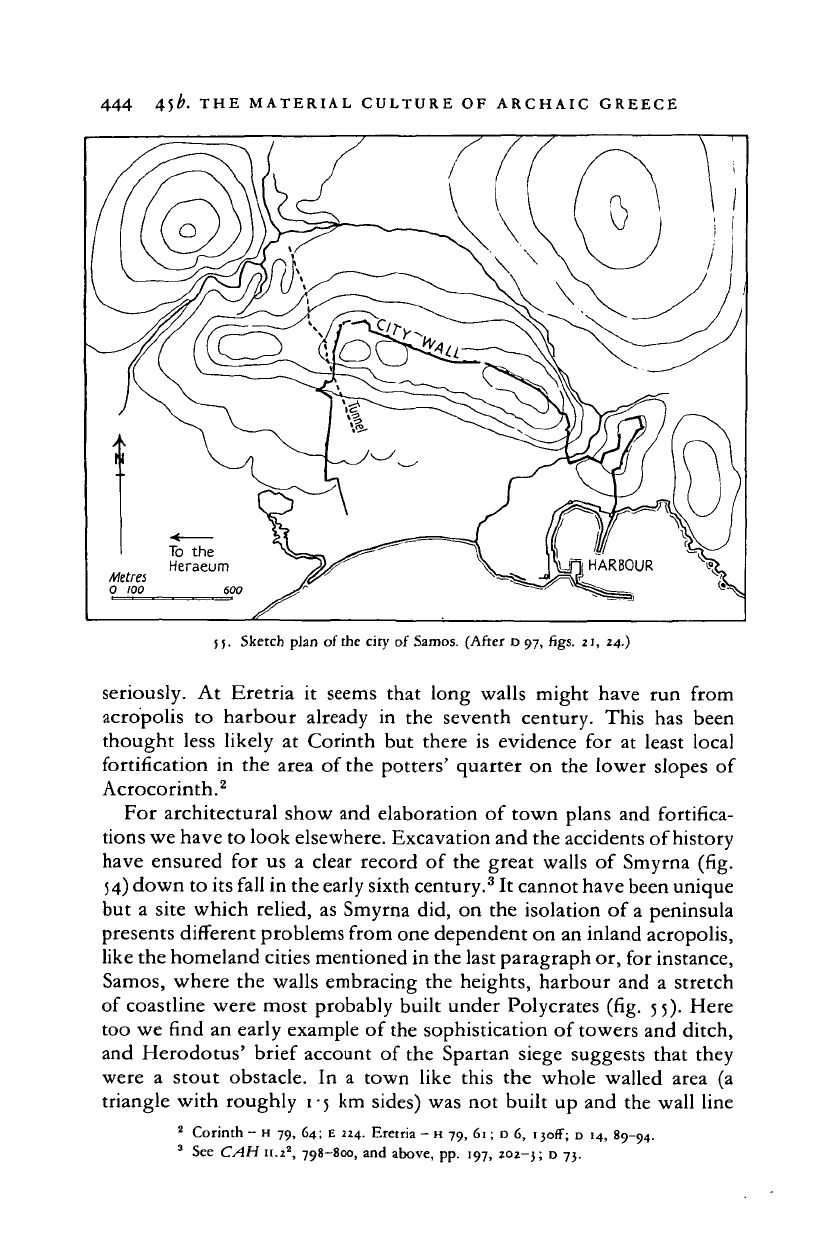
444 45^-
THE
MATERIAL CULTURE OF ARCHAIC GREECE
Metres
o
IOO
)).
Sketch plan of the city
of
Samos. (After
D
97, figs. 21, 24.)
seriously.
At
Eretria
it
seems that long walls might have
run
from
acropolis
to
harbour already
in the
seventh century. This has been
thought less likely
at
Corinth but there
is
evidence
for at
least local
fortification
in
the area of the potters' quarter on the lower slopes
of
Acrocorinth.
2
For architectural show and elaboration
of
town plans and fortifica-
tions we have to look elsewhere. Excavation and the accidents of history
have ensured
for
us
a
clear record
of
the great walls
of
Smyrna (fig.
54)
down to its fall in the early sixth century.
3
It cannot have been unique
but
a
site which relied, as Smyrna did, on the isolation of a peninsula
presents different problems from one dependent on an inland acropolis,
like the homeland cities mentioned in the last paragraph or, for instance,
Samos, where the walls embracing the heights, harbour and
a
stretch
of coastline were most probably built under Polycrates (fig. 55). Here
too we find an early example of the sophistication of towers and ditch,
and Herodotus' brief account
of
the Spartan siege suggests that they
were
a
stout obstacle.
In a
town like this
the
whole walled area
(a
triangle with roughly
1 • 5
km sides) was not built up and the wall line
2
Corinth
-
H
79, 64; E 224. Eretria
-
H
79, 61;
D
6,
i3off;
D 14, 89-94.
3
See
CAH
11.z
2
, 798-800, and above, pp. 197,
202-3;
D 73.
Cambridge Histories Online © Cambridge University Press, 2008
